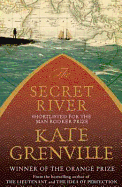

What events were masked by terms like “settled” or “took up land”, which had, until now, seemed so innocent, repeated in family stories countless times? Grenville set out on a mission to discover more about Wiseman and his story. Until this moment it had never occurred to me to wonder who might have been living on that land, and how he’d persuaded them to leave it. Now, for the first time, I wondered what had happened when Wiseman had arrived there and started the business of ‘settling’. This event, Grenville writes in her memoir Searching for the Secret River (2006), prompted an exploration of her family past:

But surely Wiseman had met the Dharug people of the Hawkesbury region? Such encounters, Grenville reflects, were absent from the family stories. But walking across the Sydney Harbour Bridge for Reconciliation in the year 2000, she exchanges a glance with an Aboriginal woman and imagines their ancestors meeting 200 years before. Grenville’s mother spoke of Wiseman with pride and intrigue, believing her convict forebears had “shown a bit of spirit … in trying to get something for themselves and their families.”įor much of her life, Grenville did not question this family folklore. Wiseman, the inspiration for The Secret River’s protagonist Will Thornhill, came to Sydney as a convict and eventually settled on the Hawkesbury River where he established a ferry-run and an inn. When Grenville was a child, her mother, a keen keeper of the family’s tales, told stories about their ancestor Solomon Wiseman. It asks provocative questions about the silences in one family, but also in our nation’s history. But The Secret River always gestured to a wider story. She wanted to fill in the blanks of inherited stories about her ancestor, a pardoned convict who may have killed Aboriginal people during Australia’s settlement. Grenville’s book began as research into her family history. Where historian Inga Clendinnen criticised Grenville for framing fiction as history, actress and director Rachael Maza has recently challenged playwright Andrew Bovell’s representation of Aboriginal experience. Should it be historians or novelists, Indigenous or non-Indigenous storytellers? The play reopens these contentious questions about who can tell the story of our shared history. Grenville’s novel sparked controversy when it was published. Neil Armfield’s new stage adaptation of Kate Grenville’s 2005 novel The Secret River invites us to think about the complex relationships between personal and national histories, and the past and the present.


 0 kommentar(er)
0 kommentar(er)
